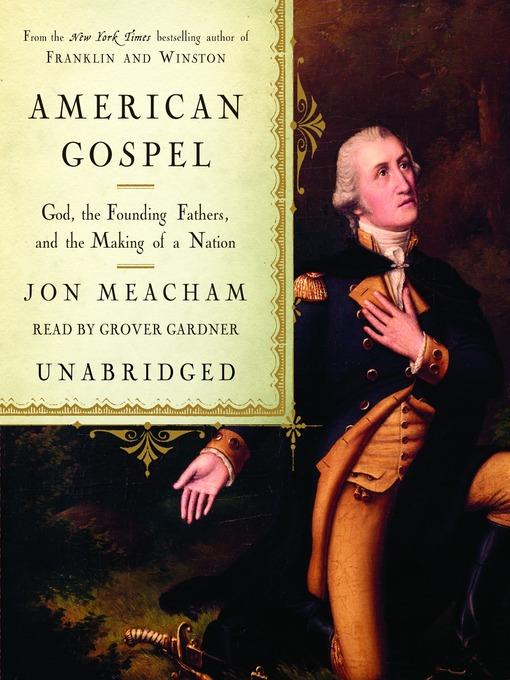
American Gospel
God, the Founding Fathers, and the Making of a Nation
کتاب های مرتبط
- اطلاعات
- نقد و بررسی
- دیدگاه کاربران
نقد و بررسی

The title is a bit misleading because this book goes up to the late twentieth century, but the author's thesis is well taken: The United States was founded by religious men whose enlightened views created a nation that accepts all faiths equally under the law. Grover Gardner is an excellent choice to narrate this work. He has a deep, resonant voice and reads in a compelling tone. Best of all, he lets the author's words speak for themselves and navigates a narrow channel in waters fraught with explosive possibilities. What we get from Meacham and Gardner are solid facts and interpretations without polemics or bows to political expediency. The Framers would be proud. R.I.G. (c) AudioFile 2006, Portland, Maine

April 3, 2006
Historian and Newsweek editor Meacham's third book examines over 200 years of American history in its quest to prove the idea of religious tolerance, along with the separation of church and state, is "perhaps the most brilliant American success." Meacham's principal focus is on the founding fathers, and his insights into the religious leanings of Jefferson, Franklin, Adams and Co. present a new way of considering the government they created. So it is that the religious right's attempts to reshape the Constitution and Declaration of Independence into advocating a state religion of Christianity are at odds with the spirit of religious freedom ("Our minds and hearts, as Jefferson wrote, are free to believe everything or nothing at all-and it is our duty to protect and perpetuate this sacred culture of freedom"). Meacham also argues for the presence of a public religion, as exemplified by the national motto, "In God We Trust," and other religious statements that can be found on currency, in governmental papers and in politicians' speeches. Subsequent chapters consider a wartime FDR and a Reagan who grew increasingly enamored of Armageddon. All are well-written, but none reach the immediacy and vigor of the chapters on the nation's birth. Two extensive appendices reprint early government documents and each president's inaugural bible verses. Meacham's remarkable grasp of the intricacies and achievements of a nascent nation is well worth the cover price, though his consideration of Reagan feels like that of an apologist.

July 17, 2006
Newsweek editor Meacham asserts at the start of this treatise on religion and its role in the nation's development: "If totalitarianism was the great problem of the twentieth century, then extremism is so far the great problem of the twenty-first century." Veteran narrator Gardner adopts an appropriate, professorial tone for the material, but the topic itself would have been better suited to an essay or an abridged audio. Meacham's discussion, while compelling when focused on the founding fathers and the middle ground that they sought in their dealings with faith and freedom, falters when he discusses later presidents and their religious views. In these segments, not even Gardner's charismatic delivery is sufficient to enliven the material, which meanders from references to God in Lincoln's inaugural address to Theodore Roosevelt's emphasis on "good works" and Woodrow Wilson's "ministerial zeal." However, Meacham's argument for a "sensible center" in religion and politics rings through loud and clear, and this rallying message, combined with his vivid re-creation of the nation's founding, may make it worthwhile for some listeners.
Copyright 2006 Library Journal, LLC Used with permission.

























دیدگاه کاربران